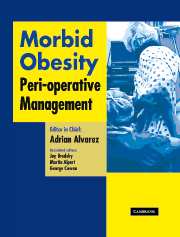Book contents
- Frontmatter
- Contents
- Contributors
- Foreword
- Preface
- Acknowledgments
- Dedication
- Section 1 General aspects
- 1 Introduction to peri-operative management: reasons for a multidisciplinary approach
- 2 Peri-operative risks and frequent complications
- 3 Informed consent in bariatric surgery and anesthesia
- Section 2 Pathophysiology
- Section 3 Pre-operative management
- Section 4 Peri-operative management of co-morbidities
- Section 5 Pharmacology
- Section 6 Monitoring
- Section 7 Intra-operative management
- Section 8 Post-operative care
- Section 9 Conclusions
- Afterword
- Index
3 - Informed consent in bariatric surgery and anesthesia
from Section 1 - General aspects
Published online by Cambridge University Press: 17 August 2009
- Frontmatter
- Contents
- Contributors
- Foreword
- Preface
- Acknowledgments
- Dedication
- Section 1 General aspects
- 1 Introduction to peri-operative management: reasons for a multidisciplinary approach
- 2 Peri-operative risks and frequent complications
- 3 Informed consent in bariatric surgery and anesthesia
- Section 2 Pathophysiology
- Section 3 Pre-operative management
- Section 4 Peri-operative management of co-morbidities
- Section 5 Pharmacology
- Section 6 Monitoring
- Section 7 Intra-operative management
- Section 8 Post-operative care
- Section 9 Conclusions
- Afterword
- Index
Summary
Abstract
Informed consent is mistakenly regarded by some as merely the witnessed signature of a patient that gives his/her consent for a given procedure(s). It means far more than that. This chapter will address informed consent in detail, particularly as regards bariatric surgery and associated anesthesia.
Introduction
Informed consent is a process mandated by law and ethics whereby the patient has the right to direct his/her health care and the physician has the duty to educate the patient concerning this care. It starts when the potential surgical patient first learns about bariatric surgery and extends through the time of the surgery. The key part of this process is the patient's learning enough about the proposed procedure(s) to make an informed decision of whether to undergo the surgery or not. Additionally, the patient's relationship with the surgeon and staff needs to be sufficiently open that they may successfully complete the necessary elements of the informed consent process. Signing the informed consent document is only a step that indicates that the informed consent process has occurred.
Decades ago when paternalism was dominant in the American practice of medicine, informed consent was ignored as neither appropriate for academic discussion nor a matter of practical concern. There are cultures elsewhere in the world that are currently in a similar transition.
- Type
- Chapter
- Information
- Morbid ObesityPeri-Operative Management, pp. 27 - 42Publisher: Cambridge University PressPrint publication year: 2004

